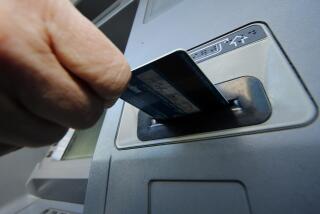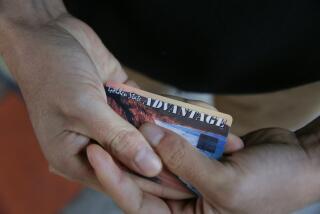Welfare Recipients May Get ATM Card Protections
- Share via
In a decision that could protect millions of welfare recipients nationwide, the Federal Reserve Board said Wednesday that consumer protections available to nearly all other Americans should also be extended to poor people who get monthly payments through automated teller machines.
The decision, tentative until the end of a 90-day comment period, will limit welfare recipients’ liability for losses if they promptly report the loss or theft of their government ATM cards. It will also require government agencies to quickly correct errors in consumer accounts.
If the rule goes into effect as proposed, it will provide immediate safeguards for millions of welfare and food stamp recipients who are already participating in test programs that provide federal and state benefits electronically.
These pilot programs, which allow welfare recipients without bank accounts to avoid costly check-cashing services, are operating in only seven states. However, similar programs are about to be launched in another 25 states. Several California counties have expressed interest in the programs but have not yet filed the federal forms required to implement them.
The U.S. Treasury Department is also testing electronic transfer of Social Security payments in Houston. And government officials predict that electronic payments could all but replace checks for federal and state entitlement programs--such as Social Security and welfare--in less than a decade.
The electronic programs allow welfare and food stamp recipients to use automated teller cards to buy groceries and get cash.
The government ATM cards work just like the ones issued by banks. Users can get cash at bank ATMs and buy groceries by running their plastic cards through a device at the checkout counter. The individual’s government “clearing account” is then debited for the appropriate amount.
In test programs in parts of Ohio, Maryland, New Mexico, Minnesota, Iowa, Pennsylvania and Wyoming, about 80% of the participants said they preferred the electronic payments to getting their checks by mail. Most of the electronic welfare programs are administered by state and county governments.
Consumer advocates say the electronic service is particularly helpful to poor people who cannot afford regular bank accounts. Traditionally, these people have had to rely on check-cashing services that charge hefty fees--sometimes up to 20% of the benefit amount--to cash government checks.
However, until now, the consumer protections that most bank customers take for granted were denied to welfare recipients.
Specifically, banking regulations say that consumers are not liable for losses of more than $50 if they promptly report the loss or theft of an ATM card. Those who are slower to report losses can be held liable for larger amounts. But, generally, consumer liability for losses is limited to $500 if unauthorized transactions are reported within two months of appearing on a bank statement. Banks must also correct errors in consumer accounts within 10 days.
However, states providing welfare benefits through ATM machines have been exempted from these rules. As a result, if welfare recipients lost their ATM cards, they might also lose every dollar the government had credited to their account. Government agencies were also not required to correct errors within any set period of time.
Reported problems are rare--just as they are with bank ATM cards, said Barbara Leyser, senior policy analyst for the Center on Social Welfare Policy and Law in Washington. However, when they do happen, they can be devastating, she said.
The Fed’s move could spur more states to offer their benefits via ATM cards because a lack of standard rules had deterred some from moving forward with electronic benefit programs, government officials said.
However, some state officials have argued that providing these consumer protections would prove costly and ultimately cause electronic benefit programs to be shelved. Several state welfare officers contacted Wednesday said they could not comment on how the Fed’s new rules would affect their programs. And some noted that the rules could still be changed.
More to Read
Sign up for Essential California
The most important California stories and recommendations in your inbox every morning.
You may occasionally receive promotional content from the Los Angeles Times.










